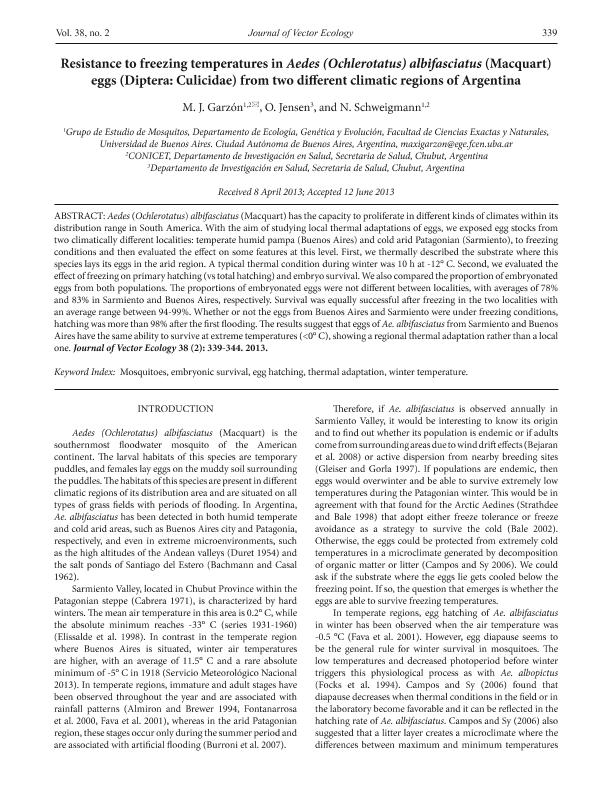Artículo
Resistance to freezing temperatures in Aedes (Ochlerotatus) albifasciatus (Macquart) eggs (Diptera: Culicidae) from two different climatic regions of Argentina
Fecha de publicación:
12/2013
Editorial:
Soc Vector Ecology
Revista:
Journal Of Vector Ecology
ISSN:
1081-1710
Idioma:
Inglés
Tipo de recurso:
Artículo publicado
Clasificación temática:
Resumen
Aedes (Ochlerotatus) albifasciatus (Macquart) has the capacity to proliferate in different kinds of climates within its distribution range in South America. With the aim of studying local thermal adaptations of eggs, we exposed egg stocks from two climatically different localities: temperate humid pampa (Buenos Aires) and cold arid Patagonian (Sarmiento), to freezing conditions and then evaluated the effect on some features at this level. First, we thermally described the substrate where this species lays its eggs in the arid region. A typical thermal condition during winter was 10 h at -12° C. Second, we evaluated the effect of freezing on primary hatching (vs total hatching) and embryo survival. We also compared the proportion of embryonated eggs from both populations. The proportions of embryonated eggs were not different between localities, with averages of 78% and 83% in Sarmiento and Buenos Aires, respectively. Survival was equally successful after freezing in the two localities with an average range between 94-99%. Whether or not the eggs from Buenos Aires and Sarmiento were under freezing conditions, hatching was more than 98% after the first flooding. The results suggest that eggs of Ae. albifasciatus from Sarmiento and Buenos Aires have the same ability to survive at extreme temperatures (<0° C), showing a regional thermal adaptation rather than a local one.
Palabras clave:
Mosquitoes
,
Embryonic Survival
,
Egg Hatching
,
Thermal Adaptation
Archivos asociados
Licencia
Identificadores
Colecciones
Articulos(IEGEBA)
Articulos de INSTITUTO DE ECOLOGIA, GENETICA Y EVOLUCION DE BS. AS
Articulos de INSTITUTO DE ECOLOGIA, GENETICA Y EVOLUCION DE BS. AS
Citación
Garzón, Maximiliano Javier; Jensen, Oscar; Schweigmann, Nicolas Joaquin; Resistance to freezing temperatures in Aedes (Ochlerotatus) albifasciatus (Macquart) eggs (Diptera: Culicidae) from two different climatic regions of Argentina; Soc Vector Ecology; Journal Of Vector Ecology; 38; 2; 12-2013; 339-344
Compartir
Altmétricas




